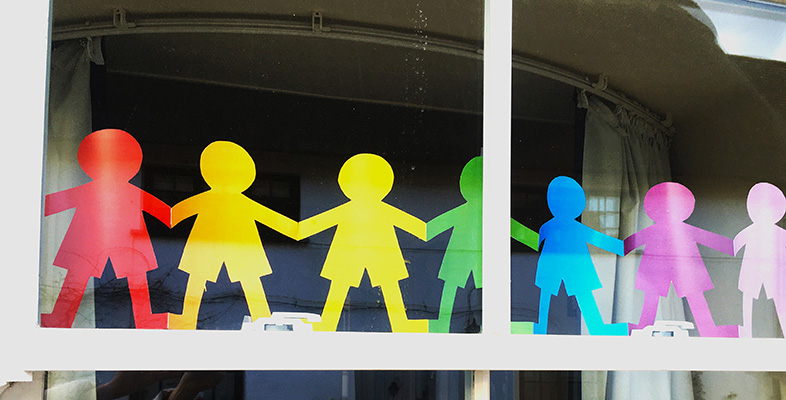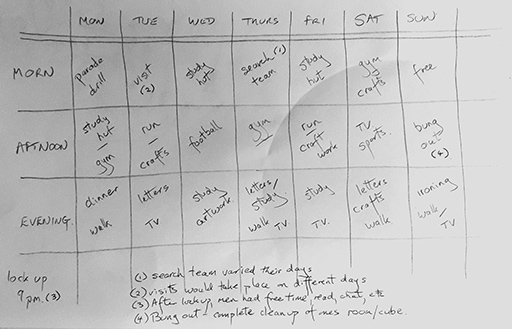2 Structure and freedom
When you are on the dance floor, there is nothing to do but dance.
The quote above was selected by Michael, as one way of thinking about and responding to situations which may be beyond our control. It is from the 2004 book The Mysterious Flame of Queen Loana, by Umberto Eco – an author Michael discovered while studying Arts with The Open University. When faced with loss and the challenge this brings, most people can and do find a way to adapt and survive. Part of this involves accepting the things you can’t do anything about and focussing on the things you can.
Throughout this course Michael and David have discussed the value of structuring your time and building your own routine to regain control over some aspects of your life, and with this find some freedom. In the Maze and Long Kesh prison during the years of conflict, prison life was strictly controlled by the internal prison authorities and external British Government policies. Yet, within the Compounds or Cages and the H Blocks, there were always ways and opportunities to regain some degree of freedom.
One way was to divide up the day into morning, afternoon and evening. In the sketch below, David outlines a typical weekly schedule he used to structure his time while in the Loyalist Compound, Compound 21 (C21) of the Maze and Long Kesh prison.
Michael also highlights the value of creating a routine, especially within the extreme restrictions of his imprisonment in the H Blocks of the Maze and Long Kesh during the years of political protests from 1976 to 1981. One aspect of his routine included a communal event to look forward to at the end of the day such as shared storytelling through the cell doors (or the creative retelling of books people had once read), as you heard in Audio 1.
Below is a list of tips from David and Michael, for activities which helped their mental and physical wellbeing during long periods of confinement. Some were mentioned in Audio 1 above. Others are highlighted elsewhere in this course. Take a moment to read the list of activities below.
Mind
- Challenge yourself and broaden your horizons.
- Learn a new skill: a language, knitting, painting, gardening.
- With a new language, practice your skills by speaking it out loud.
- Undertake new routines/schedules.
- Take journeys in your mind to keep your memory sharp. Going to the seaside for a summer day as a child. Walking around the streets or areas you lived. Try to picture all the different shops, the houses, the street names.
- Go through a favourite book or film and trying to recall the different scenes.
- Set your own quizzes. Name all the states in USA. Name all counties in Ireland. Think of all the football teams in England. How many animals can you name that start with letter b, c, etc.
- Try meditation or mindfulness.
- Consider a short course or other forms of education.
Body
- Include physical activity in your daily routine.
- Take the opportunity to exercise outside if restrictions allow.
- Exercise indoors, you can use whatever you have around you to exercise to the best of your ability – lifting cans of food as weights, walk up and down the stairs, sits ups in the living room, lifting cans of food as weights.
- Set yourself distance goals to achieve, even if you are in a confined space.
- Try Yoga, Pilates or Taiichi.
- Do daily stretches.
One striking difference for those of us in lockdown during the COVID-19 pandemic in 2020, is the range of social and cultural resources available online. For those who have internet access there is a treasure trove for discovery and exploration, from the confines of your home. During the COVID-19 pandemic, many cultural and learning events are free. So why not try something new?
For example, a short internet search (at the time of writing) shows that you can hear an intimate performance by up and coming musicians direct from their home, take part in shared storytelling or listen to compelling true stories by others. You can listen to sounds from cities around the world and contribute your own, travel to the seven wonders of the world or visit a library in another country. You can read Tolstoy’s War and Peace with others in an online book club or set up your own virtual book club. You can travel into space with the Apollo13 mission. You can learn a new language or enrol in a new course whether in the Arts to Social Sciences, Maths or Astronomy, Health or Wellbeing to develop your mind and hone your questioning and critical thinking skills. (You can check out links to these and other free resources in the Further resources section at the end of this session.)
For those without internet access, there are many activities (mental and physical) you can do with a little imagination, books, pens and paper, including all of the activities outlined by David and Michael in the tips above. (You can check out links to these and other free resources in the Further resources section at the end of this session.)
Activity 4 Creating a new routine
Take a moment to think about your current routine, if you have one.
- How different is this from your old routine/what changes have you had to make?
- Now, either use the table below, or click on the link below that which will take you to an empty table, or use the table to create a new routine.
- Is there anything missing from your routine, from the list above that you would like to add?
| Week | Monday | Tuesday | Wednesday | Thursday | Friday | Saturday | Sunday |
|---|---|---|---|---|---|---|---|
| Morning | |||||||
| Afternoon | |||||||
| Evening | |||||||
| Notes |
A new routine: table [Tip: hold Ctrl and click a link to open it in a new tab. (Hide tip)] (You might find it useful to print this.)

